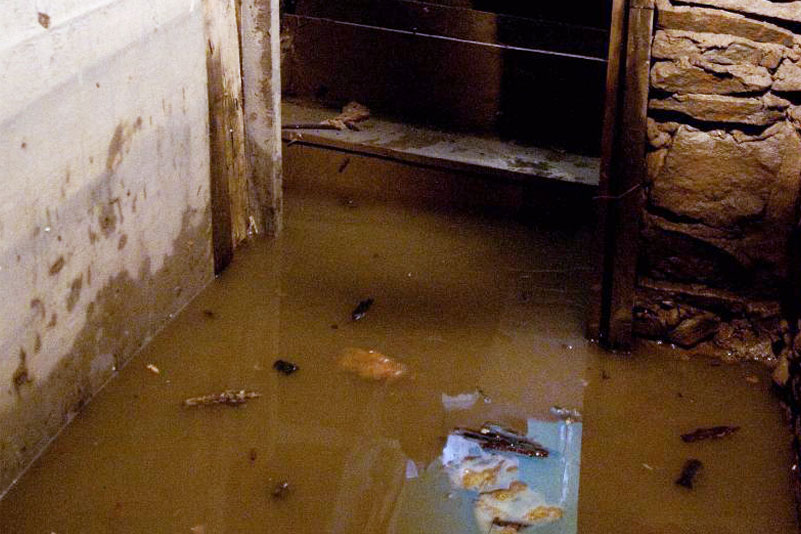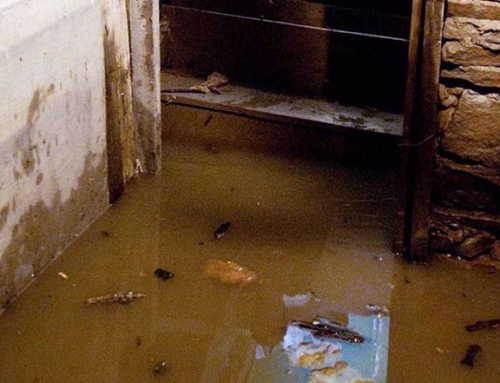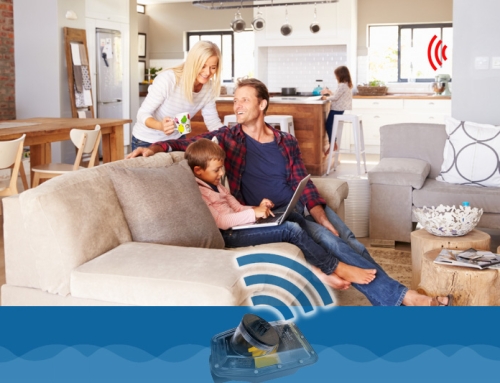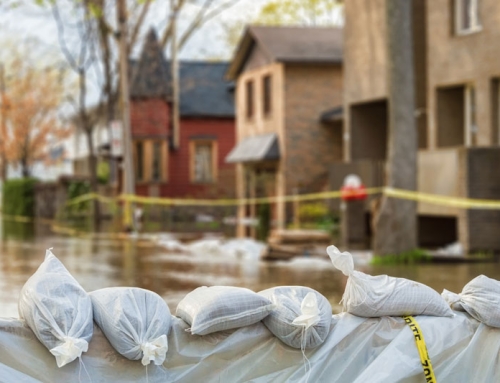How Sewer Backups Can Make You Sick
A basement full of raw sewage is never a good thing. Unfortunately, floods can expose people to some pretty gross things. But beside grossing you out, floodwater can make people seriously sick. That means everyone should avoid coming into contact with floodwater whenever possible. To evade getting sick, take precautions to avoid putting floodwater in contact with your mouth or your children’s mouths, and practise good flood hygiene, especially if you have sewage-tainted water in your flooded home. Be especially careful of open cuts and wounds if you’re thinking of walking through your flooded basement (which many people do—the problem is when bacteria gets into cuts and causes infections).
Here’s a few gross possibilities of what can be lurking in floodwater, as cited by the Centers for Disease Control and Protection:
- Fecal matter: can cause diarrheal disease (such as E. coli or Salmonella infection)
- Household, medical, and industrial hazardous waste (chemical, biological, and radiological)
- Sharp objects such as glass or metal fragments that can puncture your hands and lead to infections
Beyond being just “gross”, floodwater can cause serious health injuries. “Flood water mixes a cocktail of sharp objects, fecal matter and hazardous wastes, like fuel stored in a basement that tips over in a flood. When everything is mixed together, this cocktail becomes even more dangerous,” explains Payk Pourzynal, president of Backwater Solutions. That means homeowners want to avoid floodwater entering their house, such as by installing a sewage backwater valve in your basement. Even if you can’t visibly see toilet paper floating in a flooded basement, you should assume that sewer backup water might be contaminated with fecal matter. It might look like “grey” water from a dishwasher or bathtub, but that’s not a safe bet for your health: consider it as potentially contaminated.
Fecal matter in sewage can cause diarrheal disease
Being exposed to raw sewage (which can include fecal matter) can cause negative health effects, including passing on diarrheal diseases.
Escherichia coli, known as E. coli for short, is a bacterium commonly found in the lower intestine of warm-blooded beings. Most strains are harmless, but some can cause food poisoning (think of lettuce recalls due to contamination). E. coli is typically expelled from human bodies within fecal matter, which is how it can end up in sewer water that backs up into your basement. Fecal-oral transmission is how E.coli travels back into the human body (if your hands touch fecal matter, and then touch your mouth, for example).
Similarly, Salmonella infection (salmonellosis) is a common bacterial disease inside the intestinal tract. The Salmonella bacteria are normally active in animal and human intestines, and then are expelled through feces. Once again, the best way to prevent Salmonella is to avoid touching your mouth with hands contaminated with fecal matter: for example, make sure you thoroughly wash your hands after you do something like change a diaper and before you prepare a meal.
If you feel unwell, seek medical attention. E. coli can cause diarrhea, abdominal pain and nausea. Signs of Salmonella include nausea, vomiting, abdominal cramps, diarrhea, fever, chills, headache and blood in the stool.
Yuck: Sewer backups in your basement
Avoiding contact with raw sewage will help to prevent diarrheal diseases like E. coli and Salmonella. Even better: try to avoid getting feces in your basement in the first place.
Of course, nobody would ever intentionally dump raw sewage in their basement. But during heavy rainstorms, your city’s system for draining water can become overwhelmed with water. That means the sewage pipes that carry sewage away from your house can back up, causing a flood in your basement, and the water can contain fecal matter.
You already know it’s better to circumvent diarrheal diseases when you can, so avoid situations where you can actually smell sewage in your basement. Removing the valve cleanout cap is just as dangerous if you’re trying to clean the valve yourself—also beware of breathing in sewer gases!
Keep raw sewage out of your house with a sewage backflow preventer
One way to help prevent sewer backups is to install a backwater valve. When it’s working as designed and cleaned and maintained on a regular basis according to the manufacturer, a backwater valve allows water from your toilets, sinks and washing machines to flow out of your house and into the city’s sewer pipes. If something like a heavy rainstorm along with uncleaned sewer systems by the municipalities causes the water to flow backwards, from the city’s pipes into your pipes, there is a free floating door on the backwater valve that “lowers the drawbridge” to prevent sewer water from entering your home. The backwater valve helps to keep the “grossness of sewage water from entering your basement.
Once your sewage backflow preventer is installed, remember to have the backwater valve regularly cleaned. That’s the best possible protection to ensure it’s working properly when a flood starts looking for a path into your basement. And that can help to keep fecal matter out of your rec room or spare bedroom.
How to prevent E.coli or salmonella infections during floods
Besides installing a backwater valve to prevent raw sewage from flowing into your basement during a heavy rainfall that overwhelms a city’s system for draining water, there are other steps to avoid the health risks associated with floods.
The Centers for Disease Control and Protection suggest everyone practise good hygiene to prevent an E. coli or Salmonella infection during floods:
- Don’t eat or drink anything that might be contaminated with floodwater.
- Wash your hands after contact with floodwater. Always wash before meals.
- Wash your children’s hands with soap and water frequently. Always wash before meals.
- Keep kids out of floodwater areas.
- Don’t let kids play with toys contaminated by floodwater that have not been disinfected.
- Don’t bathe in water that may be contaminated with sewage or toxic chemicals, including rivers, streams, or lakes contaminated by floodwater.
While it’s not always easy to practise good hygiene when you’re in the middle of a flood, doing so can help to prevent uncomfortable and harmful diarrheal diseases like E. coli or Salmonella.
Common illnesses linked to floods
Nobody likes to think of getting sick, but it’s better to be aware of possibilities before a flood happens. According to the Centers for Disease Control and Protection, four of the most common illnesses linked to floods are:
- Wound infections
- Skin rash
- Gastrointestinal illness
- Tetanus
As always, seek medical attention if you or your family suffer from one of these flood-linked illnesses, or if you have any other symptons that warrant health care.
Prepare your home for a flood by installing a sewer backwater valve properly, then have it maintained regularly by a professional to help prevent flooding in your basement. If your region experiences a flood, follow hygiene protocols to avoid coming in contact with fecal matter, along with other gross things found in floodwater like household, medical, and industrial hazardous waste and sharp objects like metal and glass fragments that may cause puncture wounds.











